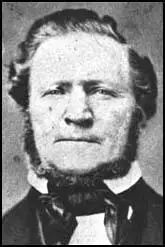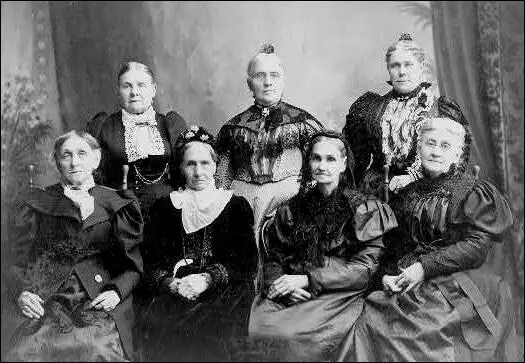Brigham Young

Brigham Young was born in Whittingham, Vermont on 1st June, 1801. He worked as a carpenter and joiner in Mendon, New York. In 1830 Young read the Book of Mormon. Two years later Young joined the Church of Jesus Christ of Latter-day Saints and was sent to preach in Canada.
In 1834 Young accompanied Joseph Smith in the Mormon march to Missouri. The following year he was named third of the Quorum of the Twelve Apostles. In 1839 Young travelled to England where he established a mission that eventually was responsible for persuading large numbers to emigrate to the United States.
Young returned to the Mormon community of Nanvoo in Commerce, Illinois. By 1843 the Mormons had over 20,000 members. Mormon views on plural marriage created a great deal of local hostility and Joseph Smith and his brother, Hyrum Smith, were imprisoned. On 27th June, 1844, 150 masked men broke into Carthage jail and killed the two men.
After the death of Joseph Smith Young emerged as the new leader of the Mormons. Driven out of Illinois, Young led the expedition to the Rocky Mountains. He selected Salt Lake in Utah as the main gathering place of the Mormons and in December, 1847 became president of the church.
In 1850 President Millard Fillmore appojnted Young as governor of Utah. He held the position until 1857 when President James Buchanan sent in federal troops led by General Albert S. Johnson to remove him from power. Although denied political office, Young remained president of the Mormon church.
Unlike some religions like the Quakers, the Mormons supported the idea of owning slaves. Young told Horace Greeley in 1859: "We consider it of divine institution and not to be abolished... If slaves are brought here by those who owned them in the states, we do not favor their escape from the service of those owners."
Brigham Young argued in 1870: "Since the day that we first trod the soil of these valleys, have we received any assistance from our neighbors? No, we have not. We have built our homes, our cities, have made our farms, have dug our canals and water ditches, have subdued this barren country, have fed the stranger, have clothed the naked, have immigrated the poor from foreign lands, have placed them in a condition to make all comfortable and have made some rich. We have fed the Indians to the amount of thousands of dollars yearly, have clothed them in part, and have sustained several Indian wars, and now we have built thirty-seven miles of railroad."
In 1871 Brigham Young was arrested for bigamy. A supporter of the doctrine of plural marriage, during his lifetime Young had over fifty wives and had 59 children by 16 of his wives. However, he admitted: "some of those sealed to me are old ladies whom I regard rather as mothers than wives, but whom I have taken home to cherish and support."

Brigham Young died in Salt Lake City on 29th August, 1877. By this time he had acquired a considerable fortune and left over $2,500,000 to his wives and children.
Primary Sources
(1) Horace Greeley interviewed Brigham Young for the New York Tribune in 1859.
Horace Greeley: What is the position of your church with respect to slavery?
Brigham Young: We consider it of divine institution and not to be abolished until the curse pronounced on Ham shall have been removed from his descendants.
Horace Greeley: Are any slaves now held in this territory?
Brigham Young: There are.
Horace Greeley: Do your territorial laws uphold slavery?
Brigham Young: These laws are printed; you can read for yourself. If slaves are brought here by those who owned them in the states, we do not favor their escape from the service of those owners.
Horace Greeley: How general is polygamy among you?
Brigham Young: I could not say. Some of those present (heads of the church) have each but one wife; others have more; each determines what is is his individual duty.
Horace Greeley: What is the largest number of wives belonging to any one man.
Brigham Young: I have fifteen; I know no one who has more; but some of those sealed to me are old ladies whom I regard rather as mothers than wives, but whom I have taken home to cherish and support.
(2) Brigham Young, speech (10th January, 1870)
Since the day that we first trod the soil of these valleys, have we received any assistance from our neighbors? No, we have not. We have built our homes, our cities, have made our farms, have dug our canals and water ditches, have subdued this barren country, have fed the stranger, have clothed the naked, have immigrated the poor from foreign lands, have placed them in a condition to make all comfortable and have made some rich. We have fed the Indians to the amount of thousands of dollars yearly, have clothed them in part, and have sustained several Indian wars, and now we have built thirty-seven miles of railroad.
All this having been done, are not our cities, our counties and the Territory in debt? No, not the first dollar. But the question may be asked, is not the Utah Central Railroad in debt ? Yes, but to none but our own people.

